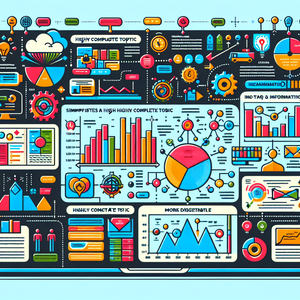Big Data and Healthcare: San Diego's Pioneers

Healthcare is one of the most data-intensive industries, generating vast amounts of information daily—from patient records to research studies. However, managing this data effectively remains a significant challenge. Traditional methods often fall short, leaving healthcare providers overwhelmed and unable to harness the full potential of the data at their disposal. This is where big data companies in San Diego come into play, offering innovative solutions to these pressing issues. The challenge lies not only in the sheer volume of data but also in its variety and velocity. Patient data can come from multiple sources, including electronic health records (EHRs), wearable devices, and genomics. Companies in San Diego are pioneering ways to unify and analyze this data, enabling healthcare providers to make informed decisions that can lead to better patient outcomes.
Pioneering Companies and Their Innovations
1. Qualcomm Life: Qualcomm Life is at the forefront of healthcare innovation, focusing on remote patient monitoring. Their platform, 2net, enables healthcare providers to gather and analyze real-time health data from patients, enhancing the ability to personalize care. For instance, a patient with chronic conditions can be monitored outside of clinical settings, allowing for timely interventions and reducing hospital readmissions. This proactive approach not only improves patient outcomes but also decreases healthcare costs. By integrating data from various devices, Qualcomm Life exemplifies how big data can streamline chronic disease management and enhance patient engagement. 2. HealthCatalyst: HealthCatalyst is another key player, specializing in data analytics and decision support solutions for healthcare organizations. Their platform aggregates data from various sources, allowing providers to make informed decisions based on comprehensive insights. A notable case study involves a large hospital system that utilized HealthCatalyst’s tools to reduce readmission rates by 30%, demonstrating the tangible benefits of data-driven decision-making in improving patient care. Their focus on actionable insights helps organizations identify inefficiencies and improve clinical outcomes. 3. Illumina: Known for its groundbreaking work in genomics, Illumina is harnessing big data to advance personalized medicine. By analyzing genetic information, they help healthcare providers tailor treatments to individual patients, thereby improving efficacy and reducing side effects. For example, their collaboration with various hospitals has led to significant advancements in cancer treatment, allowing for more accurate prognoses and targeted therapies. Illumina’s approach showcases the potential of big data in enabling precision medicine, paving the way for treatments that are customized to the genetic profiles of patients. 4. CureMetrix: CureMetrix is revolutionizing mammography readings with its AI-powered solutions. Their technology analyzes mammogram images to identify potential issues that may be missed by human radiologists. In clinical trials, CureMetrix’s software achieved a 90% accuracy rate in detecting breast cancer, showcasing how big data and AI can significantly enhance diagnostic processes and improve early detection rates. By utilizing machine learning algorithms, CureMetrix not only improves accuracy in screenings but also enables faster diagnoses, ultimately saving lives.
The Impact on Patient Care and Operational Efficiency
The integration of big data solutions in healthcare is not just about technological advancement; it is fundamentally about improving patient care. By providing healthcare professionals with actionable insights, companies like Qualcomm Life, HealthCatalyst, Illumina, and CureMetrix enable them to make better decisions, leading to enhanced patient outcomes. For instance, through predictive analytics, hospitals can identify at-risk patients and implement preventive measures, ultimately saving lives. Moreover, operational efficiencies are achieved through streamlined processes and reduced redundancies. By automating data analysis, healthcare providers can focus more on patient interaction rather than administrative tasks, enhancing the overall experience for both patients and caregivers. The integration of big data also allows healthcare systems to allocate resources more effectively, ultimately leading to reduced costs and improved service delivery.
As we look towards the future, it is clear that San Diego's big data pioneers are set to play a crucial role in the evolution of the healthcare industry. Their innovative solutions not only address the complexities of data management in healthcare but also pave the way for more personalized and efficient patient care. By highlighting case studies of companies like Qualcomm Life, HealthCatalyst, Illumina, and CureMetrix, we see the profound impact that big data can have on healthcare outcomes. As the industry continues to evolve, the collaboration between technology and healthcare will undoubtedly lead to new breakthroughs, ultimately benefiting patients and providers alike. San Diego is not just a participant in this revolution; it is a leader shaping the future of healthcare through big data innovation. The ongoing advancements in this sector promise to improve health outcomes, create efficiencies, and redefine the patient experience in unprecedented ways.
Data Scientist (Healthcare Analytics)
HealthCatalyst, Cerner, Optum
Responsibilities
Analyze complex healthcare datasets to identify trends and improve patient outcomes.
Develop predictive models that support clinical decision-making and operational efficiency.
Collaborate with healthcare providers to translate data insights into actionable strategies.
Required Skills
Proficiency in statistical programming languages such as R or Python.
Experience with data visualization tools like Tableau or Power BI.
Knowledge of healthcare regulations and data privacy standards.
Bioinformatics Analyst
Illumina, Genentech, Scripps Research
Responsibilities
Analyze genomic data to support personalized medicine initiatives and research.
Interpret complex biological datasets, providing insights for clinical trials and patient care.
Develop and maintain bioinformatics pipelines for data processing and analysis.
Required Skills
Strong background in molecular biology and bioinformatics tools (e.g., BLAST, GATK).
Familiarity with programming languages such as Perl or Python for data analysis.
Experience with large datasets and data visualization techniques.
Machine Learning Engineer (Healthcare Focus)
CureMetrix, IBM Watson Health, Philips Healthcare
Responsibilities
Design and implement machine learning algorithms to enhance diagnostic tools and patient monitoring systems.
Collaborate with data scientists to refine models based on clinical needs and outcomes.
Ensure models are scalable and integrated within existing healthcare IT systems.
Required Skills
Expertise in machine learning frameworks (e.g., TensorFlow, PyTorch) and understanding of algorithms specific to healthcare data.
Experience with cloud computing platforms (e.g., AWS, Azure) for deploying models.
Strong coding skills in languages such as Python or Java.
Clinical Data Manager
Quintiles, Covance, Medpace
Responsibilities
Oversee the collection, management, and analysis of clinical trial data.
Ensure data integrity and compliance with regulatory standards throughout the research process.
Collaborate with clinical teams to identify data requirements and reporting needs.
Required Skills
Proficiency with clinical data management systems (e.g., Medidata, Oracle Clinical).
Understanding of Good Clinical Practice (GCP) and FDA regulations.
Strong analytical skills and attention to detail.
Health Informatics Specialist
Kaiser Permanente, UCLA Health, Sharp Healthcare
Responsibilities
Implement and optimize electronic health record (EHR) systems to improve data accessibility and usability for healthcare providers.
Analyze workflows and propose data-driven solutions to enhance patient care delivery.
Train healthcare staff on the effective use of informatics tools and technology.
Required Skills
Knowledge of healthcare information systems and interoperability standards (e.g., HL7, FHIR).
Strong communication skills for interacting with clinical staff and stakeholders.
Background in healthcare administration or informatics.


